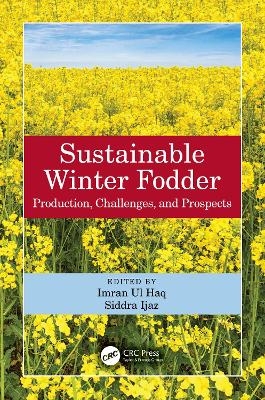
Sustainable Winter Fodder
CRC Press (Verlag)
978-0-367-51836-3 (ISBN)
Forage crops are an essential component of livestock’s diet. Production and availability of sufficiently good quality forage under diverse ecological dynamics are fundamental to develop an efficient and productive livestock industry.
Growers worldwide, especially in developing and underdeveloped countries, face significant challenges in producing sufficient winter fodder. The livestock population is increasing at high rates, and its feed requirement is increasing accordingly. Fodder crops are the leading and cheapest source of feed for livestock; however, the shortage of fodder production is the primary limiting factor for livestock production. This book features an extensive overview of literature providing information on winter fodders used in livestock management.
Key features
Discusses breeding strategies of winter fodders through conventional approaches and biotechnology.
Highlights production, agronomy, and bioecology of winter fodder crops.
Provides comprehensive information on the ecological dynamics of winter fodders.
Describes the use of precision agriculture for mitigating the effect of climate change on winter fodders.
Relays challenges of winter fodder crops on account of microbes, toxins, pests, and diseases.
This book is written for researchers and practitioners in agronomy, biotechnology, bioecology and is a comprehensive guide for improving winter fodder production.
Dr. Imran Ul Haq is Associate Professor in the Department of Plant Pathology, University of Agriculture Faisalabad, Pakistan. He has established Fungal Molecular Biology Laboratory Culture Collection (FMB-CC-UAF), and is an affiliated member of the World Federation for Culture Collections (WFCC). Dr. Siddra Ijaz is Assistant Professor in the Center of Agricultural Biochemistry and Biotechnology (CABB), University of Agriculture, Faisalabad, Pakistan.
Part 1: Production technologies of winter fodders 1. Conventional Breeding Strategies and Programs for Winter Fodders 2. Bioecology and Agronomy of Winter Fodder Crops 3. Biotechnological Applications for Developing Resistance Against Biotic and Abiotic Stresses and Other Quality Traits in Fodder Crops Part 2: Ecological Dynamics and Winter Fodders 4. Medicago sativa: Diseases, Etiology, and Management 5. Trifolium Species: Diseases, Etiology, and Management 6. Etiology and Management of Economically Significant Diseases of Avena sativa 7. Hordeum vulgare: Diseases, Etiology, and Management 8. Rapeseed and Mustard: Diseases, Etiology, and Management 9. Impact of Environmental and Edaphic Factors on Winter Fodders and Remedies 10. Application of Precision Agriculture: Mitigating the effect of Climate Change on Winter Fodders Part 3: Challenges of winter fodder crops 11. Winter Fodder: Opportunities and Challenges in Livestock 12. Microbial Determinants in Silage Rotting: A Challenge in Winter Fodders 13. Impact of Pests on Winter Fodder Preservation 14. Toxins of Preserved Fodders: A Threat to Livestock 15. Quality Seed Production of Winter Fodder Crops
| Erscheinungsdatum | 04.10.2021 |
|---|---|
| Zusatzinfo | 25 Tables, black and white; 6 Line drawings, black and white; 7 Halftones, black and white; 13 Illustrations, black and white |
| Verlagsort | London |
| Sprache | englisch |
| Maße | 156 x 234 mm |
| Gewicht | 453 g |
| Themenwelt | Naturwissenschaften ► Biologie ► Botanik |
| Naturwissenschaften ► Geowissenschaften ► Geologie | |
| Weitere Fachgebiete ► Land- / Forstwirtschaft / Fischerei | |
| ISBN-10 | 0-367-51836-8 / 0367518368 |
| ISBN-13 | 978-0-367-51836-3 / 9780367518363 |
| Zustand | Neuware |
| Informationen gemäß Produktsicherheitsverordnung (GPSR) | |
| Haben Sie eine Frage zum Produkt? |
aus dem Bereich


